By Arnaldo Canciani
Part four
Memorie.al / This first part of my memoirs, which covers a period of twenty years; 1928 – 1949, I dedicate it to all those who have lived and suffered like me in Albania, the inhuman deprivations and sacrifices of my parents, and my entire family. I extend my dedication, to many Africans forced to emigrate in search of better living conditions, to all the soldiers who were forced to fight in a foreign country for transient ideals and, many of them, have not seen their families again and are buried in a foreign country, to all those who are oppressed by dictatorial regimes and those unjustly sentenced to death, to the prisoners, to those who have suffered unimaginable torture.
PREFACE
Continued from the previous issue
A new home
In the first days of September, I was given a good house on the hill, near the management and visitor center. Having gathered our poor family, we moved into this house, which seemed to me like a palace. I had never had the good fortune to live in a comfortable and cozy house. It was a very beautiful and comfortable house for two families, once inhabited by technical staff.
In the previous house, where Silverio had lived, a kind of tavern was opened: one afternoon, after work, I stopped to drink a raki with Uilkon, a German soldier from my unit. Suddenly shots were heard! A fellow soldier of his had been killed. He pulled out his pistol and rushed outside, screaming: (alles kaput), all dead. He continued to scream, calling my name, but I ran home and hid under the bed.
The withdrawal of the Germans and the arrival of the partisans
During the last two months, there have been intensified night shots and ambushes during the day by the partisans. The encirclement of the Allies in the Balkans was narrowing around the Germans; one by one the satellite countries surrendered, and with us, preparations for escape were also noticed. One day the head of the area called a meeting with the heads of the Italian families: he explained that the German troops, to escape the risk of encirclement, would make a short withdrawal.
We Italians were considered as occupiers and fascists, we were going as goods to the partisan brigades and for us, no one could take care of and protect us. We assessed the situation that we considered that to follow the retreating troops, we had to face the unknowns of many dangers, through all of Albania and Yugoslavia, without being clear and sure about the destination, which was Italy. I must admit that in these circumstances the Austrian leaders of the company behaved correctly.
Most of the families decided to stay: without a doubt, then it seemed the best solution. No one knew or could imagine what the behavior of the Albanian partisans towards us would be. The caravan with Germans left on the morning of October 17, 1944; only two soldiers were on a motorcycle that would destroy all the machinery, exploding the explosives placed beforehand.
Without suffering any danger, a lightning-fast intervention by the partisans avoided this unnecessary destruction. At six in the afternoon, several hundred of these guerrilla heroes came down from the hill, like grasshoppers. They were well received by the entire population, even by our side. The fascist period was closed, which put an end to the occupation, the fighting in our area stopped, we hoped that the situation would improve in general.
These new champions of freedom, blinded by the Marxist, Stalinist, Russian ideology, were only worried about establishing a new dictatorship. Few of us know the true meaning of the word communism; anti-fascists like me thought that they would bring reforms in favor of the working class, freedom, respect, and better living conditions for the lower classes.
Their equality was to bring the richer to the same level as the poorer class. Soon the dream disappeared, I remember the title of a song, and then very fashionable, “Illusion, fantasy, sweet are you”!
Survival
We close this parenthesis, work resumed normally, temporarily employed by the former AGIP leaders. We took various machines to the workshop that had been lost and hidden by the Germans on the pretext that they had been saved from the bombing, and this allowed us to repair and fix some equipment. There were no local specialized work timers at that time, the reconstruction of Albania was the work, merit, and sacrifice of the Italians. On the other hand, for six months they were not given a penny of pay. Under various pretexts, raids on our houses began, which after a protest demonstration, were later suspended.
On December 1, 1944, they liberated Shkodra, the last city in the North, which was still in the hands of the Germans: This date coincided with the death of an Italian soldier, who came down from the mountains where he was enslaved and had become the object of the market of some peasants. The body of the Unknown Soldier was placed in the corridor of the isolation room next to the hospital. A few hours later the deceased was moved to an adjacent room, to make way for the coffin.
The next day I took part in the funeral on behalf of the workers, the cemetery was nearby and the coffin was carried on our shoulders. Three days later, the brother of my friend, Neri, who was wounded during a check, died; the body was sent to the same place, as three days ago and so they understood that three days ago, the burial was done in an empty box.
After the withdrawal of the German troops, the nightmare of the bombing was over, but the preoccupation was great regarding the economic situation: at the end of the month, the salaries were not paid. On my days off, I would go to help my father, to renovate the houses damaged by the air attacks. They were ruined houses, built with wall systems with foundations intertwined with tree branches and connected with mud. For payment compensation we received, a little money or payment in kind, with fruits and vegetables.
I was impressed by one of these huts, inhabited by two old people; the blind man with a beard, the woman, with a razor, without soap, tried to shave him, but in the end the face of this poor man turned into a massacre from the blood of the cuts. Another small source of income came from the sale of lanterns that I produced in the workshop, avoiding control.
I used duralumin material, removing the sheets of the propellers of the crashed planes. This was an item that was in demand, as there were no lanterns in the trade. Another trick was to exchange bottles of kerosene with the villagers, which was used for lamps and other purposes, in exchange for it I got chickens and eggs. About 160 liters of fuel, which was left when the Germans left, was a necessary theft to supplement the little food that was given to us rationed. The year 1944 was coming to an end and during the end-of-year holidays, we were given an advance on our salaries.
14 Napoleons, 10 from AIPA and 4 from the new communist leaders. This helped us to spend a calmer Christmas and on New Year’s Eve, the first ball was organized at the after-work club.
Prisoners of the Albanian communist regime
The forecast for the New Year 1945 did not look rosy. On January 14, a joint meeting of the Albanian and Italian trade unions was held, to elect the representatives of the local unions: to represent the Italians, Lino Zanni, a Genoese, and I, as a good connoisseur of the Albanian language, had taken the task. The unions were theoretically meant to protect the interests of the workers, but in practice, in communist regimes, they only served to control the workers and make them passively accept the good and bad laws, imposed by the government; within the structure of that time, no other doctrines were allowed, from those of the Marxist doctrine.
Only the newly elected Albanian, Llambi Maqina, a former shoemaker, intervened. Lieutenant Bona, along with two sergeants of the Italian army, who had recently joined the partisan brigades, spoke in defense of the new regime. Their action was not met with much sympathy from us. On February 10, we went to Tirana, through Elbasan, to participate in the congress and elect the representatives of the national unions. Among the various speeches, Zanni also spoke, who explained the situation and the hopes of the Italians.
There were not many illusions, we knew that our task was not easy; the only desire was to gain freedom and return to Italy. On January 13, after the congress closed, I took the road home. Many problems were waiting to be solved by us and I did not see even a ray of light for their solution. I do not remember who was the initiative of the organization of the Italian anti-fascist youth, many young people were scattered throughout the country, some did not have a family, and we gave them a room in the After-work Club.
The inauguration took place on March 4, with the participation of some authorities. In this circle, we often found ourselves talking and discussing the dream of returning home. The post of president was given to Mario Truini and I accepted that of deputy. But we quickly realized that we would be monitored, with the criticisms expressed towards the regime, it was irresponsible and dangerous. The goals and thoughts, and different ideas, were in conflict with the laws. I believe that Lieutenant Bona and two sergeants were not strangers to the numerous events that happened later.
They were members of the Albanian Communist Party, in mid-February; arrests of some Italians began, always for trivial reasons. No one could or would want to do harm against the Albanians. The director of the company, Tarasconi, and the deputy, Cati, were imprisoned in Berat on February 28. On the pretext of transferring them to Tirana for a regular trial, they put them on a truck and after a few kilometers they got them off on the road and shot them, with the accusation of sabotage (burning the fuel depot).
Monstrous pretexts were created on purpose! The truth is that the issue of the pit opened by the Germans to dump oil waste had been reopened; to eliminate it, it was planned to transfer it to a smaller pit, to be dug at a small distance away, and to burn in smaller quantities. The Albanian authorities deliberately created this staging to eliminate them, as they wanted to direct the Italian staff, without the previous leaders of the AIPA Company, enabling intervention in their decisions.
The resumption of the “hunt” for Italians, the denunciations and complaints for many people, constituted a trampoline to enter the party, or to achieve better positions, in profession and business. They carried out the arrest of Belokio, Xani, Profili, and others, I can’t remember all the names. A memorial plaque inside the church of Metanopoli, dedicated to Santa Barbara, reminds the director of the company, Andrea Tarasconi, Mario Cati, and Giorgio Saggiotti, tortured and then executed by shooting by the Albanian communists.
Italian Anti-Fascist Youth (G.A.I. Gioventu Anti-fashiscta italiana)
The anti-fascist youth organization began to bear its own fruits. Its members will be able to express their creativity. Some dedicated themselves to theater; the first presentation was given on April 1 with a comedy by De Filippo, “Poor Camillo”. Many Italians participated in this first performance, given in the hall of the After-work Club Theater: I played the part of Camillo; the man repeatedly deceived. I must say that I did not expect much applause. In this kind of presentation, I followed another in three acts; a subject, written by Valter Azzali, which narrates an episode of some pre-occupations of recent times; I was playing the role of a German officer.
On May 15, the first official wall newspaper of the anti-fascist youth came out, and another newspaper written by the elderly, registered in the “Garibaldi” club, so I was renamed to the After-work Club. In the newspaper of old glories, Giovani Fiori, from Viareggio, wrote, an attractive, characteristic figure of a republican, with long sideburns, in the style of Mazzini. All his articles began with: “I come out of my solitude and begin to try tirelessly, but suddenly I stop, in front of the beauty of nature.”
There were small controversies in writings on various topics, including the old glories and the hopes of the young people, but we had to be very careful not to get involved in controversies that could harm and affect the Albanians in politics, or local problems. Freedom of the press for them consisted in the continuous homage to the communist regime. They did not allow contradictory thoughts.
Despite all this, life continued even though we were forced to live with moral suffering and fear, but the flame of hope was always lit.
The repatriation of the Italian army
A Ferruccio Parri, of the Action Party, took the task of forming the first Italian government, after the end of the Second World War. One of the first initiatives of the executive was the interest to accelerate the repatriation of all the army remaining in various countries, after the capitulation of September 8, 1943, the soldiers remaining in Albania were about 25,000; most of them worked on the road, were malnourished, and lived in inhuman conditions.
The deputy of Palermo, from the Communist Party, was given the task of dealing with the Albanian government. He was given permission to return, almost all the former soldiers who were considered prisoners, but the conditions dictated by the local authorities were severe. Their request was to keep all the civilian personnel, specialized in various branches of industry, the former employees of the various companies operating in the country, which they considered essential for the reconstruction of the country.
To justify their arbitrariness in every way, they ensured that other workers would be sent from Italy for a short time to replace us, but this promise was later revealed as a lie. At the beginning of June, the departure of the army began and also a group of civilians from the workplaces, which could be performed by Albanian personnel. On August 2, the trial took place.
He took out a facsimile for the trial of Giuseppe Monaldi, requested by Lieutenant Bona, to force Monaldi to make a self-criticism, because it was considered a subversive act, monitored by the police. A farce, a staged deception! A deliberate process. Monaldi did not use it in his specific criticism and judgments. His character had created in him a dislike even in his clerical work environment, where Bona had made some doctrines.
Matteo, Andenna, and Dozi lived together in the house of the spouses, Del Core. They were the first to enter the communist cell. I did not accept; the climate of terror established by this doctrine was in contradiction with my principles and ideals and the interests of the workers. After a few months, in a chance meeting in Tirana, with a former classmate, Mario Merola told me that he was the one who maintained the relations between the Albanian communist cells and the Italian cells and had frequent contacts with Matteo, Andenna, and Dosi. So, the reason for their frequent trips to the capital was clear.
On August 28, Lieutenant Bona gave a farewell speech to all the Italians; the next day he, along with the partisans of the “Antonio Gramshi” battalion, were repatriated, they had fought with the First Albanian Assault Brigade and liberated Tirana from the German occupation. In Brindisi they handed over their weapons to the border authorities. On September 20, Valter Azzali, investigated by the Albanian police, was sent home along with other compatriots. The January of 1946 began with the arrival from Tirana of the Secretary General of the Unions.
It was a meeting where we took the opportunity to ask to discuss personally with the minister of industry, the problems that interested the Italian staff, which could not be solved at the union level. The meeting was scheduled for January 16. Francesco Teodorani and I.
Teodorani, who had replaced Zanin to represent the Italians, went to the capital to the minister Kristo Themelko, a former carpenter worker. The interview was friendly and Themelko promised his interest in our request, to seek the return of the Italians. For all the others, the answer was not very encouraging: the return was conditional, on the need to find qualified and suitable elements to replace us.
This has always been their answer to our requests for repatriation. But in reality, the exploitation continued, Italians who could be replaced by a local worker were moved somewhere else to other construction sites. One of the first to leave Devoll on March 3, 1946, was Fernando Parmigiani, he was forced to leave for Rubik, to work as a turner in a copper mine, and others had the same fate in some cases.
On February 23, on the anniversary of the founding of G.A.I., we celebrated it with a ball and a performance. It was the last chance we were allowed to be together. On March 28, we were called by the political authorities, who imposed on us the dissolution of the organization and to become part of the Albanian communist youth.
No one accepted! We handed over the key to the premises and left in silence, without any comment as a sign of protest, we let our beards grow. We could not do more! The memory of many beautiful evenings remains nostalgic, which I spent in the company of his friend Attilio Zuliani, who amused himself by using the Albanian language, parodying the speeches of the local politicians, while Antonio Spanjoleto, stood guard in the corridor; being the only anti-alcoholic who had the task of administering large doses of drinks that could enter.
It was forbidden to participate in the dances organized by them. One evening at the After-work Club, we were able to enter through the back door; we entered the room by jumping from the stage. Forty compatriots, who were allowed to return to their homeland, as a result of our involvement in the meeting with the minister, left Devoll on April 3, but were stopped for 25 days in Durrës, waiting for the boarding.
In the first days of May, a new commissioner came to replace the director Koço (Theodhosi), who moved to another position. Before he left, he went to greet all the Italians. The new arrival, more political than technical, would not be a good sign. In June, Minister Themelko came for a visit to the construction site, with which I had the last conversation. I have always had the suspicion that he came from the Del Core house. This is how my position as a union representative ended. Memorie.al




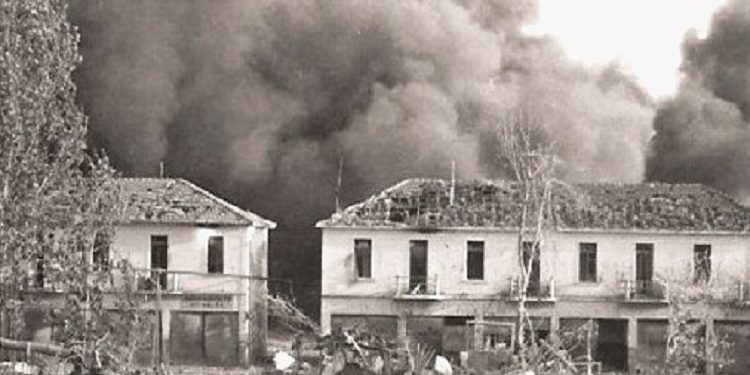
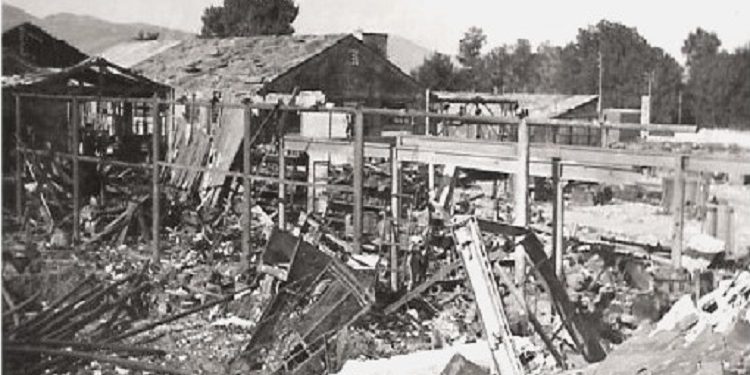
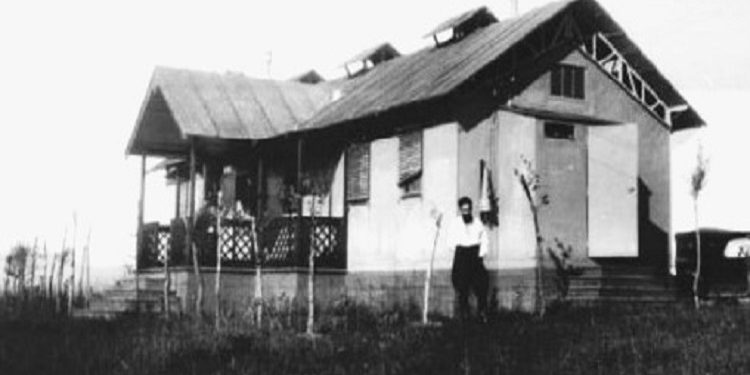
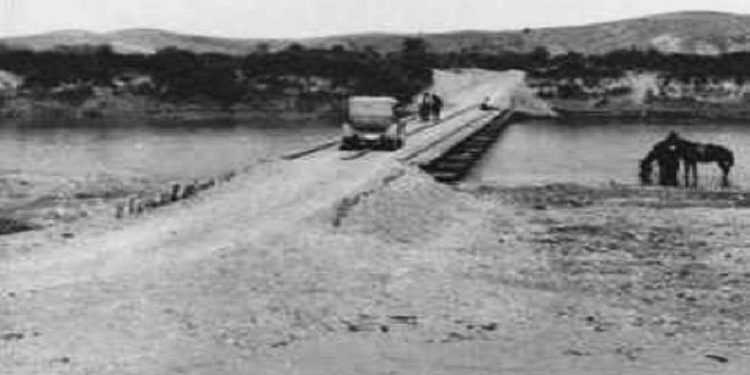
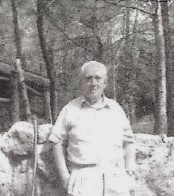
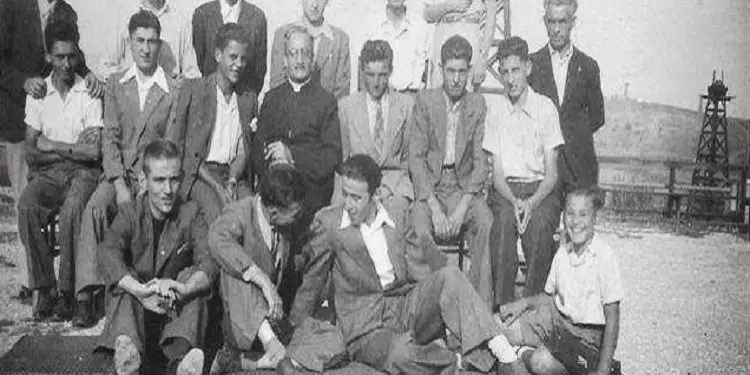
![“When the party secretary told me: ‘Why are you going to the city? Your comrades are harvesting wheat in the [voluntary] action, where the Party and Comrade Enver call them, while you wander about; they are fighting in Vietnam,’ I…”/ Reflections of the writer from Vlora.](https://memorie.al/wp-content/uploads/2025/06/admin-ajax-4-350x250.jpg)


![“The ensemble, led by saxophonist M. Murthi, violinist M. Tare, [with] S. Reka on accordion and piano, [and] saxophonist S. Selmani, were…”/ The unknown history of the “Dajti” orchestra during the communist regime.](https://memorie.al/wp-content/uploads/2026/02/admin-ajax-3-350x250.jpg)
![“In an attempt to rescue one another, 10 workers were poisoned, but besides the brigadier, [another] 6 also died…”/ The secret document of June 11, 1979, is revealed, regarding the deaths of 6 employees at the Metallurgy Plant.](https://memorie.al/wp-content/uploads/2026/02/maxresdefault-350x250.jpg)

